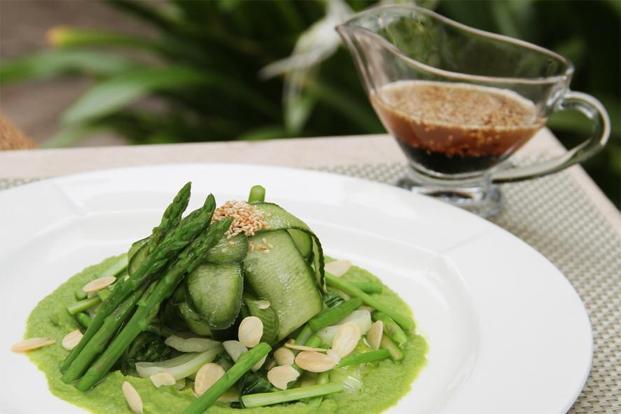Ready for post-Diwali detox?

We spring clean our homes pre-Diwali and our bodies typically need the spring cleaning post-Diwali, thanks to the relentless onslaught of festival food that’s mostly sweet, fried or both. It is common to feel guilty for having overeaten and then feel bogged down and bloated post the festive season. Cleansing your body with a detox diet helps give your body the time to recover from poor dietary choices and lack of exercise during the festive season. It also gives your energy levels a shot in the arm. Here’s how to go about it:
Increase your water intake:
Keep sipping water (Ayurveda recommends lukewarm water) throughout the day, consuming up to 2 litres. Don’t gulp down water hastily as you may swallow air, which, in turn, causes bloating. Water helps the body to metabolize toxins better and flush them out. Start the day by sipping a tall glass of lukewarm water with a few drops of lemon juice in it.
Drink green tea:
After water, the next best drink that will help you detox is green tea. It is rich in antioxidants catechins. A 2007 study in Cancer Epidemiology, Biomarkers & Prevention shows that chemicals in green tea can increase the production of detoxification enzymes in humans.
Choose natural and unrefined foods:
Wholegrain, organic, all-natural are your keywords here. This means no sugar, no refined flour, no store-bought baked goods and surely no fizzy drinks. Avoid readymade masalas and all other packaged foods during this period. Fruits and vegetables provide a range of nutrients and fibre that help with the detoxification process.
If you have access to organic produce, by all means go for it, or if you have the means to growing it yourself, nothing like it. Eating organic means your body has to work less to process the pesticides and other chemicals.
Add natural flavours:
Make your meals more flavoursome by using ginger, garlic, citrus zest, cloves, cinnamon, chillies, black pepper and so on. These spices boost flavour of the food in a healthy way. Most Indian spices like turmeric, ginger, black pepper are known for their antioxidant and immunity-building properties.
Fill up on fibre:
For any meal, choose ingredients with high-fibre content. Fibre is the best natural detoxifying agent, sweeping down all the collected debris in the intestines. Two teaspoons of isabgol (psyllium husk) with a tall glass of water half an hour before breakfast helps in regularizing bowel movement. Choose wholewheat bread over white one. Play with interesting grains like cracked wheat, red unpolished rice, and various millets for creating variety in your meals.
Chew:
Chewing the food helps it mix well with the saliva, making it alkaline, which is the body’s natural pH. Not chewing your food properly also means that it stays longer in your gut, fermenting in your intestine and causing indigestion and bloating.
What your menu should look like:
Breakfast: Porridge made using any wholegrain with milk or soya milk and sweetened with a pinch of cinnamon, or fruits; yogurt with sugar-free all-natural granola, sprinkling of nuts/sunflower or pumpkin seeds and honey; boiled egg with a sprinkling of black pepper and wholegrain toast; or sugar-free ragi (finger millet) flakes and milk.
Lunch and dinner: Mixed vegetable curry with brown rice; steamed fish or chicken with salad or wholegrains; millets pulao with cucumber-onion-tomato raita; fresh greens salad in lemon-basil-olive oil dressing with wholegrain bread (see below for salad recipes); or idlis and mixed vegetable sambhar.
Snacks: Few pieces of fruit, vegetable sticks with yogurt dip, sprouts-fruit chaat, raw seeds or nuts.
Don’t look for weight loss during detox, as any loss will be mostly due to loss of excess water and not permanent. Also, going on only-fruits or -juices diet is not recommended as it leads to loss of muscle. Make sure you eat a balanced diet rich in fruits and vegetables, but also include lean protein like fish, sprouts and tofu. Choose good fats like cold-pressed coconut and olive oil from nuts and seeds, avocados, etc.
■ ■ ■ ■ ■ ■ ■ ■ ■ ■
Asparagus, Cucumber, Pak Choi Salad
(Serves 1)
Ingredients
80g peas
100g pak choi
50g asparagus
30g almonds
1 tsp sesame seeds
1.5 tsp balsamic vinegar
1 tbsp sesame oil
60g cucumber
1 tsp extra virgin olive oil
Salt to taste
Method
Blanch the peas and finely blend them to make a thick purée. Blanch the asparagus and put in iced water. Gently heat extra virgin olive oil in a pan, chop the pak choi in four and sauté for a while. Place the puréed peas on a plate, put the pak choi, asparagus and sliced cucumber over it. Garnish with toasted almonds and sesame seeds. Make a dressing by mixing together salt, sesame seeds, balsamic vinegar and sesame oil, and pour it over the salad.
—Sandip Narang, executive chef, The Taj West End, Bangalore.
■ ■ ■ ■ ■ ■ ■ ■ ■ ■
Salad of Poached Peaches with Arugula and Goat Cheese
(Serves 1)
Ingredients
30g arugula or rocket leaves
40g romaine lettuce
1 peach
1 stick cinnamon
200ml red wine
500ml water
Zest of 1 lemon
3-4 cherry tomatoes
30g goat cheese
Salt and black pepper for seasoning
1-2 tbsp extra virgin olive oil
Method
Wash, drain and place the arugula and lettuce in iced water to keep crisp. Place de-stoned peach halves in water along with red wine and cinnamon, simmer till the fruit is evenly poached and soft but still has a bite. In a salad bowl, combine the peach halves with arugula, lettuce and tomatoes. Add the lemon zest and the seasonings. Make small spheres of goat cheese and randomly arrange on the salad. Drizzle with extra virgin olive oil.
—Arzooman Irani, executive chef , Vivanta by Taj, Bangalore.
Article courtesy: https://www.livemint.com/Leisure/7c2xkaVLE2bR1c0SVnCm4N/Ready-for-postDiwali-detox.html?fbclid=IwAR0qReLa_UUwTM7BFaYgwZYn-d40PDd1NggdOYlvBTrWRrCYhckUk3f9qIU










 Know your Dosha
Know your Dosha